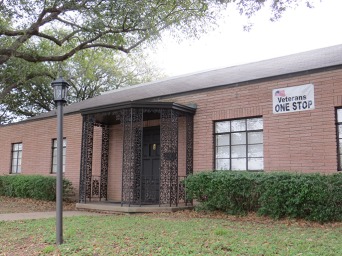 The Heart of Texas MHMR plans to seek state funds to expand counseling services available for clients at Waco’s Veterans One Stop.
The Heart of Texas MHMR plans to seek state funds to expand counseling services available for clients at Waco’s Veterans One Stop.
by Arnaldo Rodgers
The agency aims to add more support groups as the One Stop continues to grow as an alternative treatment center for veterans dealing with mental health issues.
About 13 percent of the 754 veterans who sought services at the One Stop, 2220 Austin Ave., in September had some sort of mental health issue, according to statistics provided by the One Stop.
Barbara Tate, executive director of MHMR, said the agency would like to hire a full-time clinician to counsel veterans, but that would require either grant support to fund the position or volunteer services from a clinician interested and experienced in serving veterans.
Three support groups are currently offered at the facility, though one has been temporarily suspended as MHMR works to fill a staff vacancy.
“We’ve seen a lot of people and helped a whole lot of folks over the last couple of years, so I want to build upon the successes that we’ve had and to just expand,” Tate said. “I think counseling is probably the most requested service that we have, that we don’t have a clear provider. We need to get someone to provide more counseling.”
Tate said MHMR will apply for a grant from the Texas Veterans Commission’s Fund for Veterans Assistance. The agency also will seek support from the Texas Veterans Initiative, a newly announced state program that aims to invest $1 million in programs that address veterans’ mental health needs.
Health issues
Post-traumatic stress disorder is the most common concern staff see at the One Stop, along with veterans coping with traumatic brain injury and military sexual trauma, said Melinda Bonds, program director for adult mental health at MHMR
Steve Hernandez, veteran services officer for McLennan County and one of the One Stop tenants, said he regularly sees 15 to 20 veterans who have some form of schizophrenia. Though he does not have a clinical background, Hernandez said he has been able to build a rapport with those veterans, and they specifically request him to help them with problems that arise.
At times, those veterans may report issues with reoccurring symptoms, concerns about their medication, or problems with family because of their illness. Hernandez said he has to lean on MHMR for mental health assessments and that having more counseling staff and options would benefit the facility.
“It does take a while to develop that trust, and some of these folks they come back and when they have an issue and they want to just talk to me, which is okay, but at the same time I only know so much,” Hernandez said. “There’s so much I can do, not just from a medical treatment perspective, but just making sure that they’re stable.”
A new director for the One Stop is set to begin Dec. 8, Tate said. That staff member’s duties will include leading a mental health support group and heading a military veteran peer network program that will train volunteers to assist veterans in crisis.
“A lot of people find support groups very helpful, it’s just therapeutic to tell your stories and hear other people tell their stories, so you feel like you’re not the only person with that (problem),” Tate said. “Support groups are a very effective method on working with individuals, and sometimes individuals have issues that would be better handled or that they would prefer to be handled on an individual basis.”
Another support group for women focuses on female veterans or caregivers. One Stop volunteer counselor and sociologist Fernando Garza conducts a therapy group for PTSD and also does individual assessments and counseling with veterans.
Garza, an Army veteran, agrees that more counseling resources are needed. He said many of the veterans he sees face problems with PTSD symptoms as they deal with the transition to civilian life or encounter emergencies.
“Often people find a camaraderie among the group members — whether it’s Army, Navy, Marines or Air Force — and they feel comfortable coming down this way,” Garza said. “A lot of times, the majority of them are coming in from the Waco VA medical center because they feel they can’t trust that department.”
All content herein is owned by author exclusively. Expressed opinions are NOT necessarily the views of VNR, authors, affiliates, advertisers, sponsors, partners, technicians, or VT Network. Some content may be satirical in nature.
All images within are full responsibility of the author and NOT VNR.
Read Full Policy Notice - Comment Policy




























